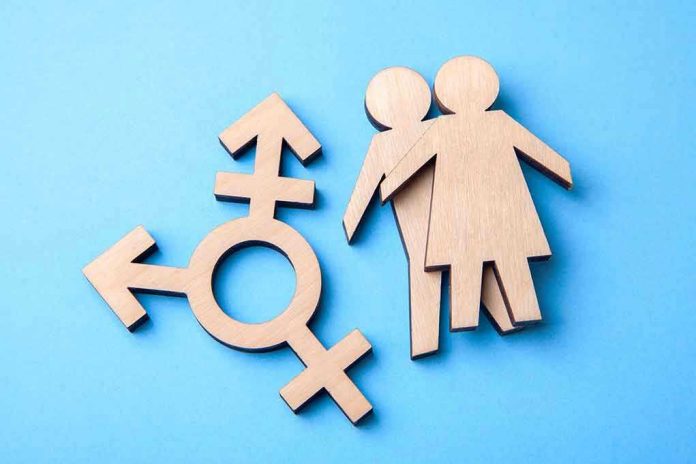
Massachusetts has ignited national outrage by appointing a biological male and trans activist to its women’s commission, sparking fierce debate over the erosion of women’s rights and the relentless advance of progressive agendas.
Story Snapshot
- Massachusetts Governor Maura Healey’s appointment of a transgender activist to the women’s commission is being called an assault on the definition of womanhood.
- Conservative and faith-based groups argue the move undermines sex-based rights and the integrity of women’s advocacy.
- The commission’s mission now explicitly includes “all women” regardless of birth sex, reflecting state-level progressive policy shifts.
- This controversy exemplifies broader national battles over gender identity, women’s spaces, and cultural values in America.
Governor Healey’s Appointment Sparks National Backlash
Governor Maura Healey’s August 2025 appointment of Giselle Byrd, a transgender activist and biological male, to the Massachusetts Commission on the Status of Women (MCSW) has become a lightning rod for conservatives and women’s rights advocates.
Critics say the move is not just symbolic but a direct challenge to the core mission of the commission, which was created to advance the interests of women and girls.
Conservative organizations and faith-based coalitions point to what they see as the erasure of sex-based distinctions, arguing that the commission’s credibility and the rights of biological women are being systematically undermined.
The commission’s chairwoman, Mary-dith Tuitt, and progressive allies have celebrated Byrd’s appointment as a milestone for diversity and inclusion, highlighting that Byrd is the first Black transgender woman to serve in this role.
Official statements from the MCSW and Byrd herself describe the appointment as a victory for intersectional advocacy and representation. However, this framing has only deepened divisions, as detractors view it as an ideological overreach, not a genuine win for women.
The appointment’s announcement drew immediate condemnation from the Massachusetts Family Institute and triggered national headlines referencing The Babylon Bee—a satirical site—underscoring the disbelief among critics that such appointments are now reality.
Women’s Spaces Redefined Under Progressive Policy
The roots of this controversy trace back to Massachusetts’ long-standing progressive stance on gender identity. Since its establishment in 1998, the MCSW has advocated for the rights of women and girls.
In recent years, however, the commission’s mission was broadened to include “all women,” explicitly disregarding biological sex. This policy shift reflects a wider legislative trend in Massachusetts, where gender identity is protected under anti-discrimination laws.
Critics maintain that these changes dilute the original intent of women’s advocacy, opening the door to appointments like Byrd’s and fueling debate over the definition of womanhood in law and policy.
Other states have faced similar controversies in recent years, but the explicit framing and high profile of Byrd’s appointment have made Massachusetts a national focal point.
The move is seen by many as emblematic of the broader left-wing agenda—one that prioritizes ideological inclusion over biological realities, with potentially far-reaching implications for women’s rights nationwide.
Stakeholders and the Growing Divide Over Women’s Advocacy
Key players in this unfolding drama include Governor Healey, who holds appointment authority; the MCSW’s progressive leadership; transgender activists; and a broad coalition of conservative and faith-based groups. Byrd, who also leads The Theater Offensive and is an active LGBTQ+ advocate, has outlined plans for further advocacy, including a public hearing for transgender women and girls in 2026.
Meanwhile, conservative organizations argue that such appointments marginalize women assigned female at birth—turning what was once a platform for sex-based advocacy into a battleground for identity politics.
Despite the heated opposition, Byrd is now actively serving on the commission, co-chairing events and participating in public initiatives.
Each of these actions is watched closely by both supporters and critics, with every public appearance and policy proposal intensifying the debate over the commission’s legitimacy and the future of women’s rights in Massachusetts and beyond.
National and Long-term Implications for Women’s Rights
Short-term fallout from the appointment has included increased polarization and amplified debates over gender identity, women’s representation, and the definition of womanhood in America.
In the long run, this decision could set a precedent for similar appointments in other states, as well as legislative or legal challenges over the definition of “woman” in public policy.
Transgender and LGBTQ+ communities view the move as a stride toward greater representation, while many women’s rights advocates remain divided—some backing inclusion, others warning of the erosion of sex-based protections.
The controversy extends beyond Massachusetts, reflecting a national struggle over constitutional principles, women’s spaces, and the limits of government overreach.
As the Trump administration rolls back progressive policies and restores constitutional protections at the federal level, state-level developments like this serve as stark reminders of the ongoing cultural battles shaping the country’s future.
Sources:
Massachusetts governor appoints male trans person to women’s commission
‘Is This a Babylon Bee Headline?’: Massachusetts Appoints Trans Activist to Women’s Commission
Men Make the Best Women: Massachusetts Appoints Biological Male to Women Commission
Caring for Our Communities – Massachusetts Commission on the Status of Women
Massachusetts Commission on the Status of Women
List of transgender public officeholders in the United States – Wikipedia











